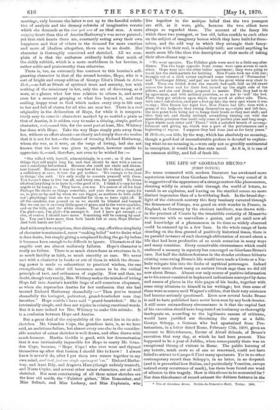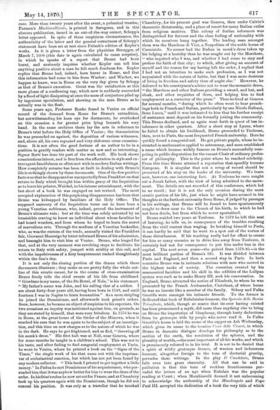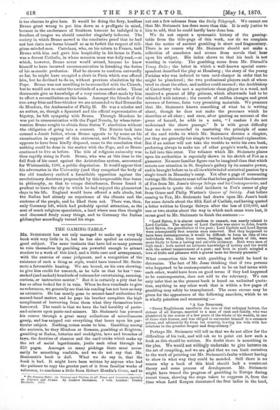THE LIFE OF GIORDANO BRUNO.* [FIRST NOTICE.] No name connected
with modern literature has awakened more mysterious interest than Giordano Bruno's. The very sound of it is suggestive of the appearance of a strange meteor-like phenomenon, shooting wildly in erratic orbit through the world of letters, to vanish in an explosion, and leaving on the startled senses no more
distinct impression than of a bewildering flash. lathe broad day- light of the sixteenth century this fiery luminary careered through the firmament of Europe, was gazed on with wonder in France, in England, in Germany by the choicest intellects, was drawn with- in the precinct of Courts by the irresistible curiosity of Monarchs' to converse with so marvellous a genius, and yet until now all real knowledge of a phenomenon in its time so widely observed could be summed up in a few lines. In the whole range of facts standing on the firm ground of positively historical times, there is no parallel instance of such thorough obliteration of record about a
life that had been productive of so much sensation in many ways and many countries. Every conceivable circumstance which could enshroud a memory in mystery has converged on Giordano Bruno's case. Not half the dubious features in the slender evidence hitherto existing concerning Bruno's life would have made a Grote or a Nie- buhr relegate him into the limbo of mythical personages. Indeed we know more about many an ancient Greek sage than we did till now about Bruno. Almost our only source of positive information as to his career consisted in haphazard indications conveyed by dates and names of places in the title-pages of his books, together with some stray allusions to himself in his writings ; but then some of these were so scarce until Wagner's edition, that their very existence had become seriously questioned. Even now several books Bruno is said to have published have never been seen by any book-hunter.
A still more extraordinary circumstance is it that the capital fact of his execution should have long rested on testimony so thoroughly inadequate as, according to the legitimate canons of criticism, would have justified our dismissing the story as a fable.
George Schopp, a German who had apostatized from Pro- testantism, in a letter dated Rome. February 17th, 1600, gives an account to Rittershauseu, Rector of Altorf Schools, of Bruno's execution that very day, at which he had been present. This happened to be a year of Jubilee, when consequently there was an exceptional throng of visitors in Rome. The public burning of any heretic, much more so of one so renowned, could not have failed to attract to Campo di Fiori many spectators. Yet in no other
contemporary record than Schopp's, in no letter, in no despatch (and it is proverbial how Italian, and particularly Venetian, envoys noticed every occurrence of mark), has there been found one word of allusion to this tragedy. How is this silence to be accounted for? Nor does this absence of record exhaust the dubious features in the
• Vita di Giordano Bruno. Seritta da Domenico Berti. Torino. 1868,
case. More than twenty years after the event, a polemical treatise,
Pazman's Machiavellizatio, is printed in Saragossa, and in this obscure publication, issued in an out-of-the-way corner, Schopp's
letter appeared. In spite of these suspicious circumstances, the authenticity of the letter and the general correctness of Schopp's statement have been set at rest since Fritsch's edition of Kepler's works. In it is given a letter from the physician Breugger, of March 7, 1608 (this date is again calculated to cause surprise), in which he speaks of a report that Bruno had been burnt, and anxiously inquires whether Kepler can tell him anything positive about a man he felt much fondness for. Kepler replies that Bruno had, indeed, been burnt in Rome, and that this information had come to him from Wacher; and Wacher, we happen to know, was in Rome on the very day given by Schopp as that of Bruno's execution. Great was the satisfaction at this mere gleam of a confirming ray, which now is suddenly succeeded by a flood of light dissipating at once the mass of conjecture piled up by ingenious speculation, and showing us the man Bruno as he actually was in the flesh.
Some years ago, Professor Ranke found in Venice an official record of the demand from Rome for Bruno's extradition, but notwithstanding his keen eye for documents, he overlooked on this occasion a far greater prize lying beneath his very hand. In the same archives there lay the acts in reference to Bruno's trial before the Holy Office of Venice ; the denunciation he was proceeded on against, the deposition of various witnesses, and, above all, his own repeated and very elaborate cross-examina- tions. It is not often the good fortune of an author to be in a position to gratify readers with matter so new and so interesting. Signor Berti has done his part of the work well. His book shows conscientious labour, and is free from the affectation in style and ex- travagant fancifulness so often met with in modern Italian writings. How completely surmise has been at fault in dealing with Bruno's life is strikingly shown by these documents. One of the few positive facts was that he disappeared so unexpectedly from Frankfort on that return to Italy which brought him within grasp of the Inquisition as to leave his printer, Weichel, to his intense astonishment, with the last sheet of a book he was engaged on not revised. The most accepted explanation of this perplexing disappearance has been that Bruno was kidnapped by familiars of the Holy Office. The supposed emissary of the Inquisition turns out to have been a young Venetian nobleman, who, indeed, proved the instrument of Bruno's ultimate ruin ; but at the time was solely actuated by an irresistible craving to know an individual about whose faculties he had heard wonders, and from whom he hoped to learn the secret of marvellous arts. Through the medium of a Venetian bookseller, who, as was the custom of the trade, annually visited the Frankfort fair, Giovanni Mocenigo by letter informed Bruno of his admiration, and besought him to visit him at Venice. Bruno, who longed for that, and at the very moment was revolving steps to facilitate his return to Italy with safety, jumped with avidity at this call, and with the impulsiveness of a fiery temperament rushed thoughtlessly within the lion's den.
It is not only the closing portion of the drama which these documents illustrate ; they make us see pretty fully the whole out- line of this erratic career, for in the course of cross-examination Bruno freely tells the chief events of his life from childhood. "Giordano is my name, of the De Bruni, of Nola," is his statement. "My father's name was John, and his calling that of a soldier. I am about forty-four years old, having been born in 1548, and until fourteen I was in Naples to learn humanities." As a mere stripling he joined the Dominicans, and afterwards took priest's orders. Soon, however, he became an object of suspicion to his superiors. On two occasions an inquiry was instituted against him, on grounds, as they are stated by himself, that were very frivolous. In 1576 he was in Rome, at the great house of the Order of the Minerva, when it reached his ears that he was again to be the subject of an investiga- tion, and this time on new charges as to the nature of which he was in the dark. He says he got frightened, and so fled, "throwing off his monk's dress." His first halt was at Noll, near Geneva, where for some months he taught in a children's school. This was not to his taste, and after failing to find congenial employment at Turin, he went to Venice, where he printed a book on the "Signs of the Times," the single work of his that came out with the imprima- tur of ecclesiastical sanction, but which has not yet been found by any modern collector. "This book I printed to get together a little money." In Padua he met Dominicans of his acquaintance, who per- suaded him that it was anyhow better for him to wear the dress of the order. In hisfriar's robes he now set outfor France, and at Charnbery took up his quarters again with the Dominicans, though he did not conceal his position. It was only as a traveller that he touched Chambery, for his present goal was Geneva, then under Calvin's theocratic dictatorship, and a place of resort for many Italian exiles from religious motives. This colony of Italian reformers was distinguished for fervour and the close feeling of nationality with which its members hung together. The leading man amongst them was the Marchese di Vico, a Neapolitan of the noble house of Cara6ciolo. No sooner had the Italian in monk's dress taken up his lodging at a hostelry than he was sought out by the Marchese, "who inquired who I was, and whether I had come to stay and profess the faith of that city; to which, after giving an account of myself and the reason for my having left the order, I replied that I had not an intention to make such profession, as I was not acquainted with the nature of faiths, but that I was more desirous of living in freedom and safety than of aught else." However, he deferred to his countrymen's advice not to wear the monastic dress, "the Marchese and other Italians providing a sword, and bat, and cloak, and other requisites of dress, and helping him to find employment as a corrector of the press." Thus he lived at Geneva for several months, "during which he often went to hear preach- ing both in French and Italian, particularly by one Nicolo Balbani, from Lucca," until it was intimated to him that his further receipt of assistance must depend on his formally joining the community. This Bruno declined, and so again went forth in quest of leas in- tolerance in other quarters. After a short stay at Lyons, where he failed to obtain his livelihood, Bruno proceeded to Toulouse, then, next to Paris, the most frequented French university. Here he quickly found a congenial soil. Ile got private pupils, whom he in- structed in mathematics applied to astronomy, and soon established a name which became widely famous on Bruno's successfully com- peting in public disputation for the vacant Chair of ordinary profes- sor of philosophy. This is the point where he reached celebrity. From this time Bruno attained a reputation that speedily became European. It is singular that not a scrap of record should be preserved of his stay on the books of the university. We learn now, however, one interesting fact. At Toulouse he once sought out a Jesuit father, with the view of being admitted to the sacra- ment. The details are not recorded of this conference, which led to no result ; but it is not the only occasion during the most erratic portion of his life, just when he might have seemed in his thoughts at the furthest extremity from Rome, if judged by passages in his writings, that Bruno will be found to have spontaneously sought to draw near to the Church of his birth, to which he had not been docile, but from which he never apostatized.
Bruno resided two years at Toulouse. In 1579 he left this seat. of learning, he tells us, in consequence of the troubles resulting from the civil contest then waging. In betaking himself to Paris, it can hardly be said that he went to a spot out of the vortex of these disturbances. If his teaching really had for effect to create for him so many enemies as to drive him away from Toulouse, it certainly had not for consequence to put him under ban in the capital. The next seven years—the period from 1579-85—is the most brilliant portion of Bruno's life. It was divided between Paris and England, and then a second stay in Paris. In both countries Bruno was in intimate relations with men who moved in the highest ranks of society. The sensation created by his mnemonical faculties and his skill in the oddities of the Lullyan system was such as to make Henry III. seek his conversation. In England, Bruno attracted the notice of Elizabeth, to whom he was presented by the French Ambassador, Castelnau, of whose house he was an inmate like a member of the family. Sidney and Fulke Greville were amongst his intimate friends. To the former is dedicated that book of Rabelaisian humour, the Spaccio ddle Belida Trionfante, which, though so scarce that its ever having existed has been pronounced a myth, did more than anything else to bring on Bruno the imputation of blasphemy, through hasty deductions from its grotesque title by people who never read it. In Fulke Greville's house is laid the scene of the supper on Ash Wednesday, which gives its name to the treatise Cena delle Cencri, in which Bruno in dramatic dialogue develops his philosophy as to the motion of the earth, the revolution of the spheres, and the plurality of worlds,—the most important of all his works, and which is prominently referred to in his trial. It is not to be denied that. a spirit of wildly grotesque licence, of wanton and indecorous humour, altogether foreign to the tone of doctorial gravity, pervades these writings. In the play II Candelaio, Bruno falls even into gross obscenity. All that can be said in palliation is that this tone of reckless licentiousness per- vaded the letters of an ago when Rabelais was the popular reading at Court ; when nacchiavelli deemed it not unbecoming to acknowledge the authorship of the Mandragola and Pope Paul IL!. accepted the dedication of a book the very title of which is too obscene to give here. It would be doing the fiery, heedless Bruno great wrong to put him down as a profligate in mind, because in the exuberance of Southern humour he indulged in a freedom of tongue we should consider singularly indecent. The society in which Bruno moved is the conclusive proof that he had not lost Caste nor borne himself so as to forfeit the respect of reli- gious-minded men. Castelnau, who, on his return to France, took Bruno with him and gave him hospitality in his house in Paris, was a devout Catholic, in whose mansion mass was daily read,—at which, however, Bruno never would attend, because he knew himself to have incurred excommunication in forsaking the duties 'of his monastic profession. Had he chosen to conform outwardly so far, he might have occupied a chair in Paris which was offered him, but he declined to do BO, without previous absolution by the Pope. Bruno was not unwilling to be reconciled with the Church, but he would not re-enter the servitude of a monastic order. These documents give us knowledge of a very curious effort made by him to effect a reconciliation on this basis. Amongst the friends of the run-away friar and free-thinker we are astounded to find Bernardin de Mendoza, the Ambassador of Philip II. He was a scholar and an author, so, though a Spaniard and the official representative of bigotry, he felt sympathy with Bruno. Through Mendoza he was put in communication with the Papal Nuncio, by whose inter- vention Bruno sought to obtain from Sixtus V. absolution without the obligation of going into a convent. The Nuncio took into counsel a Jesuit father, whom Bruno appeals to by name on his examination in support of this statement, and the Nuncio, who appears to have been kindly disposed, came to the conclusion that nothing could be done in the matter with the Pope, and so Bruno 'continued to live as before. The tide of religious animosity was then rapidly rising in Paris. Bruno, who was at this time in the full flush of his onset against the Aristotelian system, announced for Whitunstide, 1586, a public disputation. It would appear that his adversaries in the University (and they comprised the body of the old teachers) excited a formidable opposition against the revolutionary doctrines propounded by this irrepressible free-lance in philosophy, so that to escape disturbances, Bruno found it prudent to leave the city in which be had enjoyed the pleasantest days in his life. England would have offered a safe abode, but the Italian had already an experience of the climate and the customs of the people, and he liked them not. There was, then, only Germany left, which had probably special attraction, as the mat of much religious speculation, a land where men then thought and discussed freely many things, and to Germany the Italian vhilosopher accordingly turned his steps.
































 Previous page
Previous page